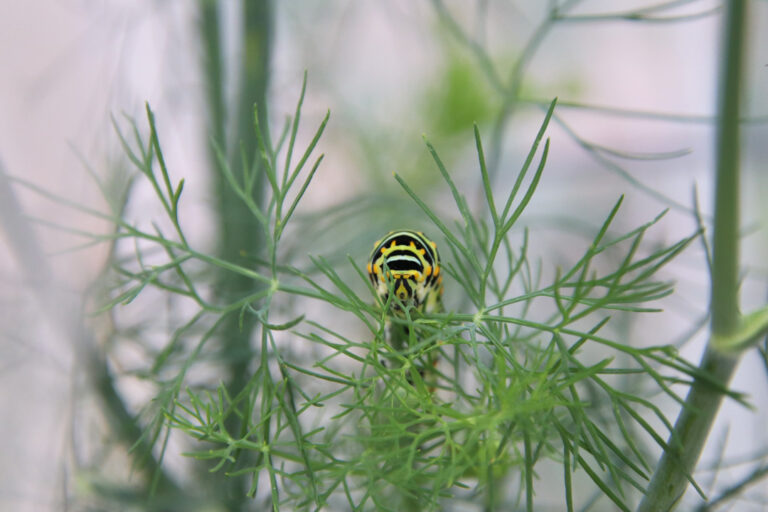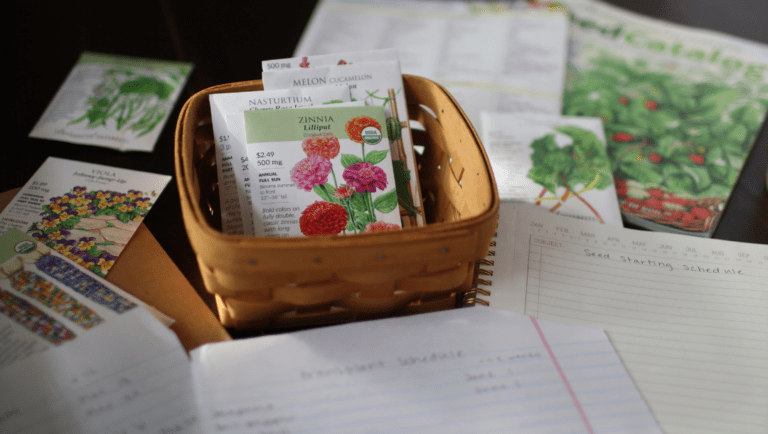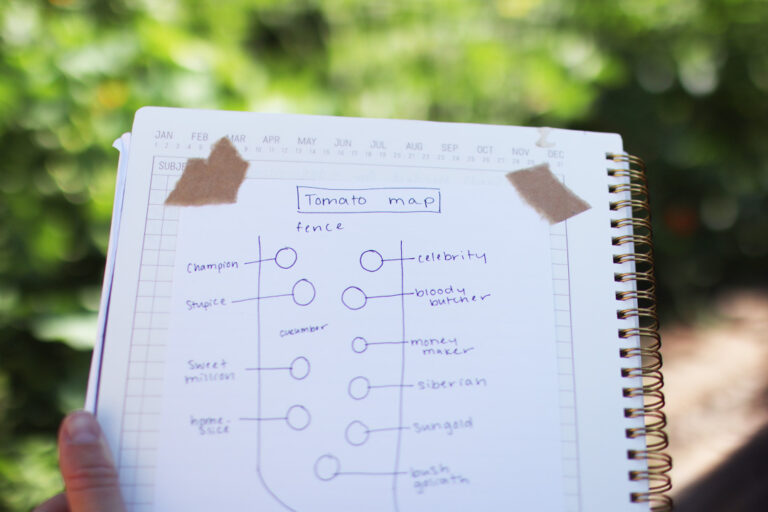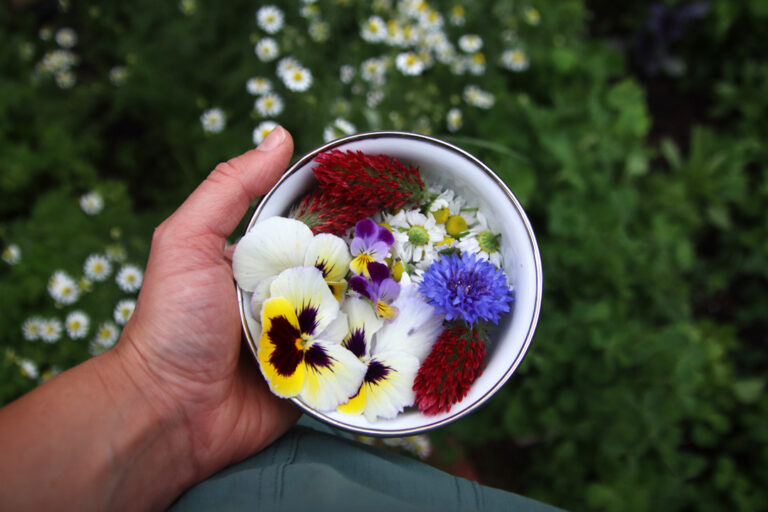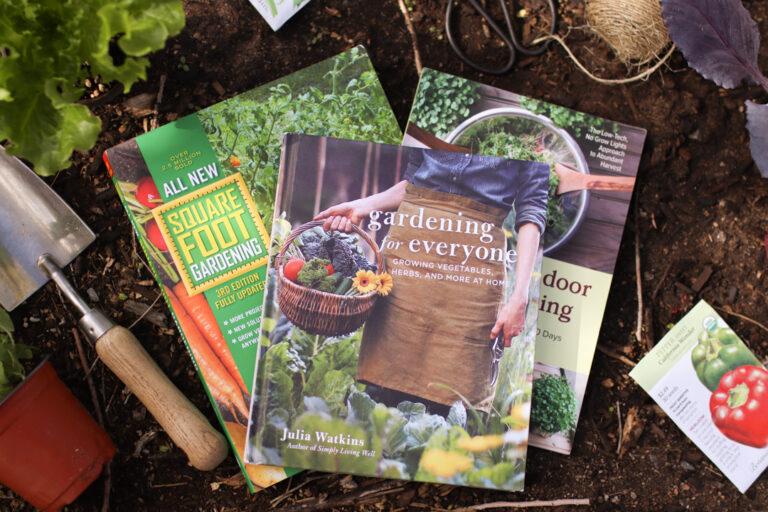How to Repel Chipmunks with Coffee Grounds & Other Methods
Keep the chipmunks from eating your garden the natural way! Learn how to repel small rodents with coffee grounds and several other simple, organic methods. No more losing your flowers, vegetables, and fruits to the chipmunks.

Will Coffee Grounds Keep Chipmunks Away?
Yes, coffee grounds repel chipmunks, squirrels, and some other rodents because they do not like the smell of coffee grounds. The use of coffee grounds as a natural repellent for pests is an effective way to keep chipmunks from eating your garden without any chemicals or traps.
Coffee grounds are not foolproof, unfortunately. Some of the most determined rodents will power through and the scent of the coffee grounds quickly dissipates as it dries out. We’ll go into how to get the best results possible below.
Table of Contents
- Why Repel Chipmunks and Squirrels
- How to Use Coffee Grounds to Keep Critters Away
- Will Coffee Grounds Make My Soil Acidic?
- Where to Get A Lot of Coffee Grounds
- Other Things You Can Do
- Your Yard is an Ecosystem

Why Repel Chipmunks and Squirrels
Almost every home gardener has to deal with pests at some point. Small rodents such as chipmunks, squirrels, and rabbits can be among the most damaging. Other times, these small rodents are completely harmless.
I try to keep an ecosystem mindset when it comes to my garden. Bugs and animals can and will eat some of my garden, and that’s okay. I do not want a sterile garden that is void of life. That said, when the ecosystem is out of balance, these pests can cause serious harm.
I’ve had my fair share of little critters taking bites out of my vegetable garden crops and digging up my flower beds. If you find yourself with a garden destroyed by a chipmunk problem, repelling them may be necessary so you can enjoy your harvests.
How to Use Coffee Ground to Keep Critters Away
Coffee grounds are a great place to start in repelling chipmunks because they are free, natural, and actually improve the soil over time.
The simplest way to use coffee grounds is to spread them on the ground around the perimeter of your garden or garden beds. This creates a barrier that the chipmunks will have to cross in order to get to your veggies.
You can also spread the coffee grounds around the plants like a mulch. I have done this as a soil amendment and it does help with the rodents as well. There are a few things to keep in mind if you spread them over your soil.
First, the coffee grounds will tie up nitrogen in the soil as they break down. This isn’t a huge problem if you are spreading them over the surface, because the plant roots will still have plenty of nitrogen-rich soil down below.
Another consideration is that when coffee grounds dry out, they can become hydrophobic and block the water from entering the soil. If you are spreading the coffee grounds thickly, consider mulching over them with leaves or grass clippings to trap some of the moisture in and keep the grounds wet.
To be effective as a natural deterrent to chipmunks, coffee grounds will need to be replenished every few weeks or as they dry out and lose their smell. If you notice they aren’t working like they used to, add a fresh layer.
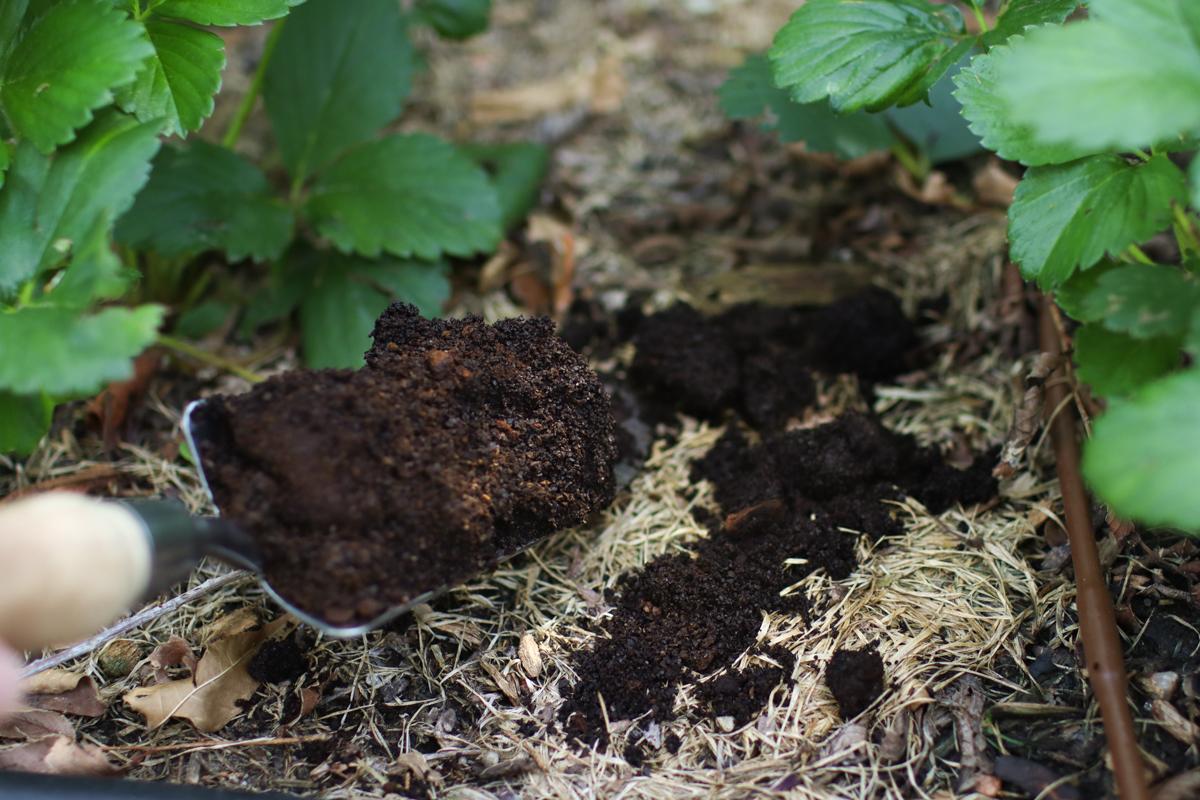
Will Coffee Grounds Make My Soil Acidic?
It is commonly believed that adding coffee grounds to your garden will cause the soil to be acidic. It’s an understandable assumption because both coffee beans and brewed coffee are acidic.
However, this is not the case with soil because the old coffee grounds are no longer acidic once the coffee has been extracted from them. That said, you should keep the amount you are adding to a reasonable amount. Don’t dump a thick layer of coffee grounds on your garden beds regularly.
In order to prevent your soil from becoming acidic, make sure you are not using unused coffee grounds. Freshly ground coffee beans will make your soil acidic and they should not be used in the garden. Get coffee grounds that are leftover from brewing coffee and use those instead.
This post contains affiliate links. If you make a purchase through the links, I will earn a small commission at no cost to you. As an Amazon Associate, I earn from qualifying purchases. Read my full disclosure here.
Where to Get A Lot of Coffee Grounds
If you have a large garden and you don’t drink tons of coffee every day, you may feel like you’ll never be able to save up enough coffee grounds to repel the chipmunks. Most households won’t produce enough coffee grounds to do this, but there are other places to get it.
I’ve had the best luck with a local coffee shop. The smaller, locally-owned coffee shops are often happy to pass along their used coffee grounds and they produce pounds of them each day. Some may want to give them to you bagged while others may ask that you bring your own bucket for them to fill. Simply call or visit some local coffee shops and ask the baristas if they are willing to save their coffee grounds for you.
Starbucks and other chain coffee shops may also offer used coffee grounds. They will be less flexible and unwilling to work with you than local coffee shops, but they also produce a lot and often bag them and store them somewhere for gardeners to grab.
It may take some time and rejection to find a coffee shop that will give you coffee grounds, but it will be worth it. You will save loads of grounds from the landfill, improve your soil health, and repel the critters that are eating your garden.

Other Things You Can Do
Coffee grounds are not the perfect way to repel those pesky chipmunks. There is no perfect way and it often requires some trial and error. The best solution is a combination of methods to keep the rodents from destroying your vegetable garden. The good news is there are many other great methods you may employ!
Hot Peppers
Hot peppers are my favorite way to keep rodents from eating my garden because they are so effective. Hot peppers can hurt their mouths and noses with the spice, but not in an inhumane way.
To use this method, you can sprinkle cayenne powder or chili powder directly onto the soil and plants.
Another way is to make a spray with cayenne extract and water in a spray bottle and then mist it all over the soil and plants. I usually do around one dropper full to 16 ounces of water. This method works a little bit better because the wind sometimes blows the dried cayenne pepper away too easily.
Both hot pepper spray and hot pepper powder will need to be replenished regularly, especially after overhead watering or heavy rain.
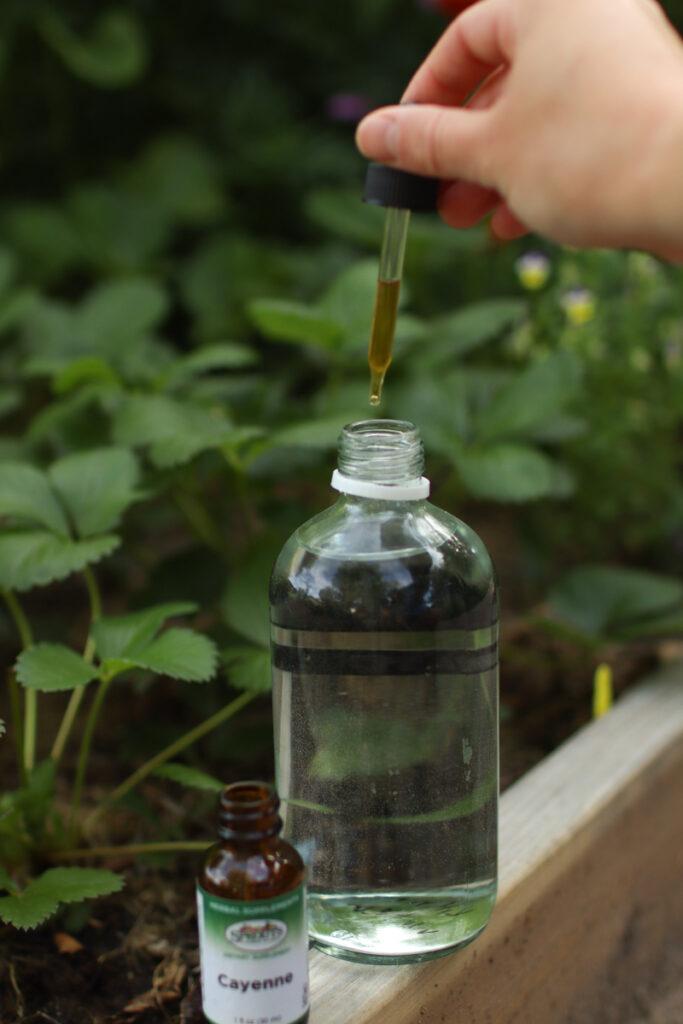
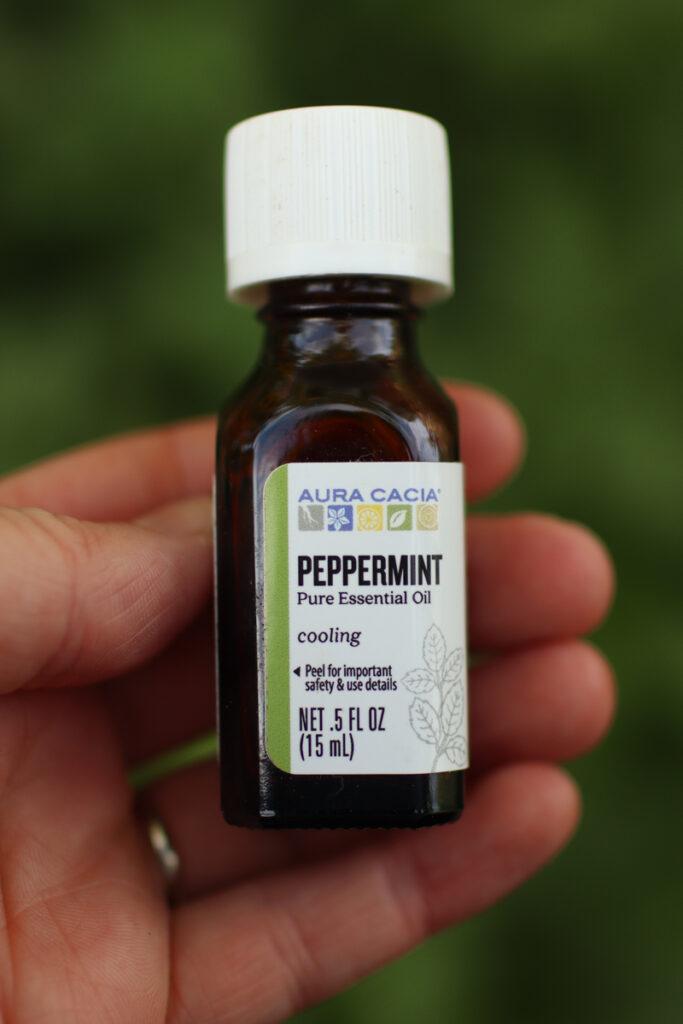
Essential Oils
Essential oils are another natural and effective chipmunk repellent. Peppermint is a strong scent that rodents do not like, so using peppermint oil is a great way to keep them out of the garden. I used peppermint oil to keep mice out of my shed and it worked beautifully. This method can be a little bit pricey, but it’s effective and smells delightful!
To use peppermint essential oil, drop several drops onto 100% cotton balls and distribute the cotton balls around your garden. Refresh the oil as needed when you notice the smell dissipating. I do recommend using essential oils from a reputable brand so you know they are real 100% essential oils. I personally use Aura Cacia because it is accessible, affordable, and my research has determined it to be quality.
Apple Cider Vinegar
Apple cider vinegar is another method that uses a pungent smell to repel the chipmunks. Small rodents do not like the smell of vinegar, so spraying it around the plants will help keep them away. To make an apple cider vinegar spray, combine it in a 1:1 ratio of vinegar to water and mist it on and around your plants.
Irish Spring Soap
A common deterrent for wildlife is shaved Irish spring soap. This sounds unusual, but this particular soap has a strong smell that wildlife doesn’t like. To try this method, I recommend shredding it with a cheese grater and sprinkling it around the soil.
It is important to note, however, that the soap may have an effect on soil health. I would avoid this method in vegetable gardens and flower beds with sensitive plants.
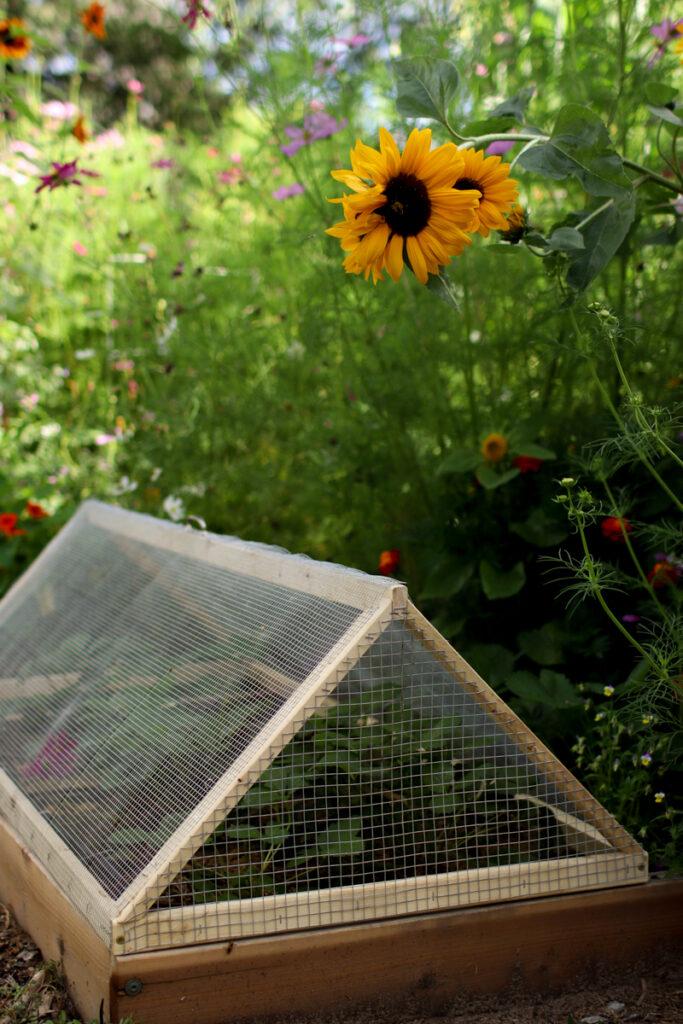
Physical Barriers
Physical barriers are one of the most effective ways to keep chipmunks away from your garden, but they have their downsides too. The primary con of physical barriers is the cost and the effort involved in building them.
A physical barrier can be an enclosure around the entire garden, like a fence, or a chicken wire cage over a specific area or raised bed.
Physical barriers are not foolproof if the rodents are particularly determined, but the effort required to break in usually deters them.
Attract Predators
One of the most natural ways to keep unwanted pests away is by making your yard an ecosystem. Bring in natural predators by installing an owl box to help with the population of the small rodents.
This may not be a good option if you have chickens or rabbits free-ranging. While owls aren’t typically a predator because they are nocturnal, it is worth considering before installing an owl house.
Reduce the Attractions
An important aspect of keeping chipmunks out of your garden is not attracting them in the first place. Along with repelling them, make sure you eliminate food sources as much as possible.
This may mean removing pet food and bird seed and using a closed compost pile. While removing these sources of food won’t immediately send the rodents away, it will help with the problem.
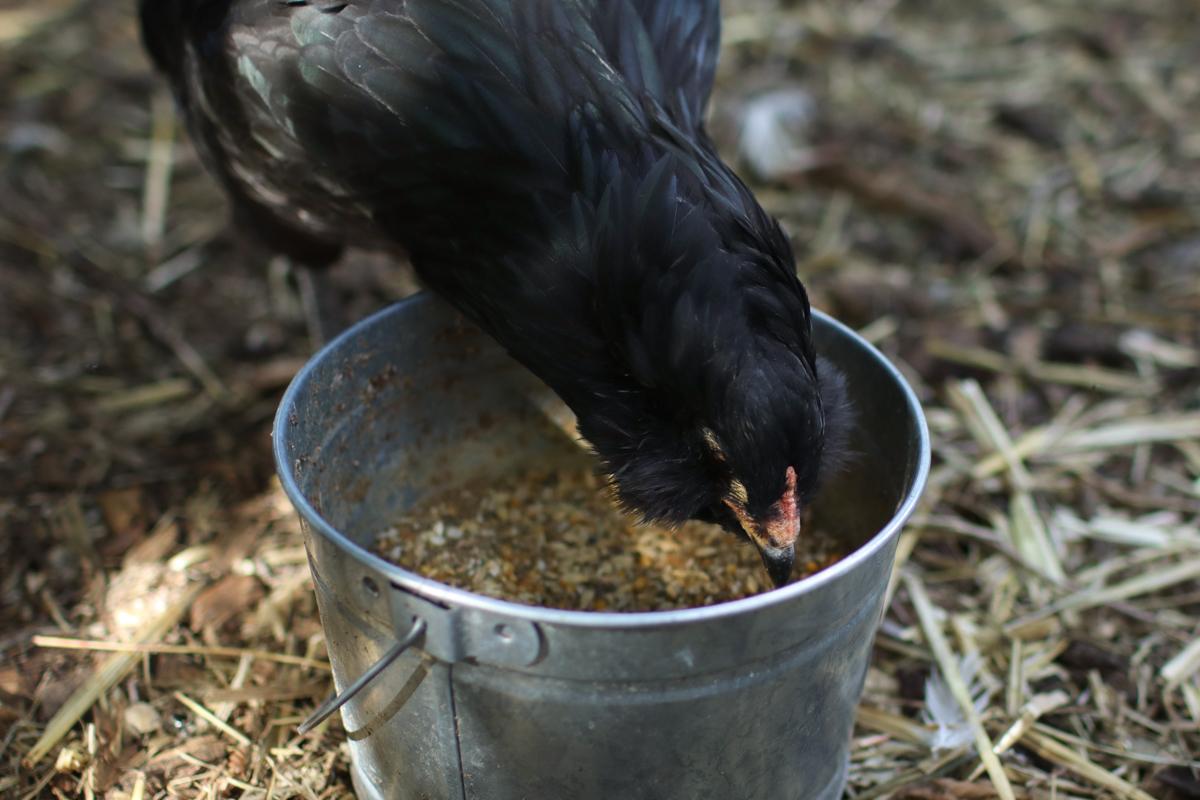
Fake Predators
Scaring the chipmunks away with fake signs of predators is a great way to keep them out of your garden. Predator urine can be purchased online and sprayed around the garden. The strong smell of it warns small mammals of a potential predator so they stay away. Sometimes rubber snakes or plastic owls can work too, but make sure you are regularly moving them.
Your Yard is an Ecosystem
While you work to keep the chipmunks from eating your whole garden, it’s important to remember that some nibbles are a good thing. When you are growing a healthy garden the organic way, it’s natural – and a good thing – to have some bugs and wildlife. A healthy garden attracts them and each species keeps the others in balance. When one species takes over, such as an aphid infestation or chipmunks destroying all of your plants, then it is a problem. If you find the odd tomato with nibbles taken out of it, don’t fret. It simply means your yard is a vibrant ecosystem for insects, animals, and you to enjoy.



